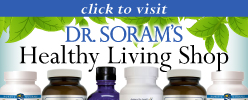
- Iron utilization
- Elimination of free radicals
- Development of bone and connective tissue
- Production of melanin, a skin and hair pigment
Still, the amount of copper that the body needs is small — less than the amount in a penny — and studies are finding that too much copper can lead to a number of health problems.


 Even in some of the richest countries in the world, environmental toxins could be making you “health poor.” In fact, even with the best diet, regular exercise and an optimistic outlook, your health can be impacted by the air you breathe, the water you drink, the food you eat, and even the soil in which your food is grown.
Even in some of the richest countries in the world, environmental toxins could be making you “health poor.” In fact, even with the best diet, regular exercise and an optimistic outlook, your health can be impacted by the air you breathe, the water you drink, the food you eat, and even the soil in which your food is grown.
 About one out of every 75 people may experience a panic attack at some point in their life, but for some, the very fear of having another attack can lead to full-fledged panic disorder, and a number of serious related complications.
About one out of every 75 people may experience a panic attack at some point in their life, but for some, the very fear of having another attack can lead to full-fledged panic disorder, and a number of serious related complications..aspx?width=220&height=220) When you go to your local market and take a look at all the toothpastes on the shelves, the choices can be overwhelming. You can choose from tartar control, whitening, sensitivity reduction or total control formulas. Many of these brands are simply cosmetic, while some of the others have been clinically approved by the American Dental Association to improve oral hygiene by reducing plaque, which is one of the major causes of periodontitis.
When you go to your local market and take a look at all the toothpastes on the shelves, the choices can be overwhelming. You can choose from tartar control, whitening, sensitivity reduction or total control formulas. Many of these brands are simply cosmetic, while some of the others have been clinically approved by the American Dental Association to improve oral hygiene by reducing plaque, which is one of the major causes of periodontitis. Most trips to the beach are pleasantly uneventful with visitors taking in the sun, sand and surf, and maybe searching for a seashell or two. Assuming you know how to swim, choose a day when the weather is good and the water is calm, and don’t stay out in the sun for too long, the beach hardly looks like a place full of potential hazards … but in this case looks can be deceiving.
Most trips to the beach are pleasantly uneventful with visitors taking in the sun, sand and surf, and maybe searching for a seashell or two. Assuming you know how to swim, choose a day when the weather is good and the water is calm, and don’t stay out in the sun for too long, the beach hardly looks like a place full of potential hazards … but in this case looks can be deceiving. Bananas are not only America’s #1 fruit, they may also have been the first fruit on earth, according to the International Banana Association, which notes that banana plants have been in cultivation since history has been recorded.
Bananas are not only America’s #1 fruit, they may also have been the first fruit on earth, according to the International Banana Association, which notes that banana plants have been in cultivation since history has been recorded. Close to 107 million U.S. adults have cholesterol levels of 200 mg/dL or higher, a level that the American Heart Association says increases the risk of heart disease and stroke. At least 12 million of these people are taking statin drugs to lower their cholesterol levels, but there are more natural options out there.
Close to 107 million U.S. adults have cholesterol levels of 200 mg/dL or higher, a level that the American Heart Association says increases the risk of heart disease and stroke. At least 12 million of these people are taking statin drugs to lower their cholesterol levels, but there are more natural options out there. Like a taunting teenager, a nosy mother-in-law or a meddling neighbor, food messes with our emotions. A bowl of ice cream can make you happy. An entire carton of ice cream can make you sad. Just the smell of a home-cooked meal when you can’t have one can make you lonesome and a bowl of chicken noodle soup can make you feel better.
Like a taunting teenager, a nosy mother-in-law or a meddling neighbor, food messes with our emotions. A bowl of ice cream can make you happy. An entire carton of ice cream can make you sad. Just the smell of a home-cooked meal when you can’t have one can make you lonesome and a bowl of chicken noodle soup can make you feel better.


